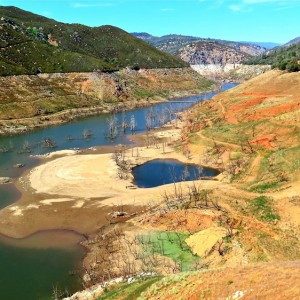The Stream, September 1: Saudi Arabia, Jordan Sign Agreement Over Shared Aquifer
The Global Rundown |
Neighbors in the Middle East sign a rare groundwater agreement. A tax increase helps Minnesota study its rivers and lakes, while drought in Nevada drains Walker Lake. Algae blooms cut property values in Vermont. Green groups in India rally against a canal project.
“We just pray that they could build the dam somewhere else. Site C … I feel bad about it … It’s going to cause a lot of grief among aboriginal people. This will be underwater forever. We’ll never see it again.” — Gerry Attachie, a member of the Dane-zaa people, who will see ancestral graves flooded by the reservoir proposed for the Peace River Valley, in northeastern British Columbia. (Globe and Mail)
By The Numbers |
$US 9 million: Amount spent annually in Minnesota on monitoring water pollution. The funds come from a sales tax increase that was passed in 2008, which has turned the state into a national leader in water-quality assessments. A budget-cutting deal, however, will reduce funding for the next two years. St. Paul Pioneer Press
14 feet: Decline in water levels in Nevada’s Walker Lake, a natural lake in the Great Basin desert, in the last four years. No trout have been caught in the increasingly salty waters in years. Las Vegas Review-Journal
$US 50,000: Reduction in property value for nearly three dozen summer cottages on Lake Champlain because of annual algae blooms. Associated Press
Science, Studies, And Reports |
Jordan and Saudi Arabia signed an agreement to limit and regulate groundwater pumping from a shared aquifer. It is a rare deal: only the fourth aquifer shared by multiple countries to be governed by a legal agreement. International Water Law blog
On The Radar |
Graves, ceremonial spaces, and other sacred sites will be flooded if British Columbia builds Site C dam, a $CN 9 billion project that will inundate 5,000 hectares of land. The construction of an access road to the proposed dam site will soon began. Globe and Mail
Green groups in India are demanding a new environmental assessment of a proposed canal between the Ken and Betwa rivers. The project, which would cross a national tiger reserve, would be the first river-linking project in a grandiose scheme to connect the country’s major rivers. Livemint
Brett writes about agriculture, energy, infrastructure, and the politics and economics of water in the United States. He also writes the Federal Water Tap, Circle of Blue’s weekly digest of U.S. government water news. He is the winner of two Society of Environmental Journalists reporting awards, one of the top honors in American environmental journalism: first place for explanatory reporting for a series on septic system pollution in the United States(2016) and third place for beat reporting in a small market (2014). He received the Sierra Club’s Distinguished Service Award in 2018. Brett lives in Seattle, where he hikes the mountains and bakes pies. Contact Brett Walton







Leave a Reply
Want to join the discussion?Feel free to contribute!